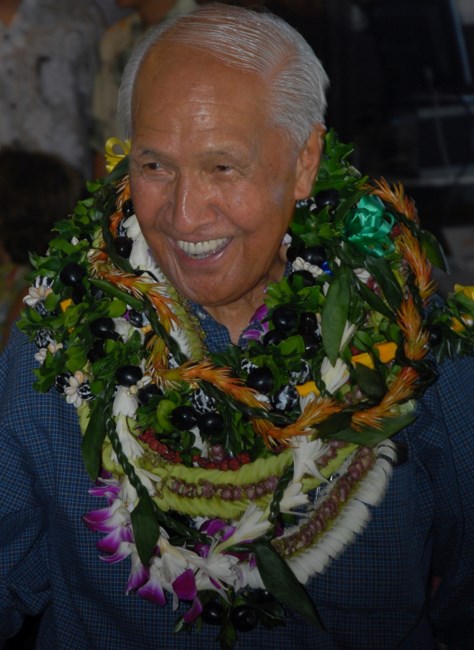
OBITUARIO
Edward Leilani Kamae
8 agosto, 1927 – 7 enero, 2017

Hawaiian Son Edward (Eddie) Leilani Kamae passed peacefully in his sleep on January 7, 2017, with his beloved wife Myrna at his side. His signature composition “E Ku`u Morning Dew” was playing in the background. He was 89 years old. Eddie was an ukulele virtuoso, singer, arranger, composer, and film producer. His legendary group the Sons of Hawaii was a leading voice in the resurgence of Hawaiian music during the Hawaiian Cultural renaissance. A deep desire to learn about the music he played and loved led Eddie on a life-long journey to find the sources of the music. With Myrna as producer, he eventually produced ten award-winning documentary films on different aspects of Hawaiian culture and traditions, earning recognition as The First Hawaiian Film Maker.
Eddie first rose to prominence in 1948 as an ukulele virtuoso whose complex styling brought new attention to the instrument. His unique way of playing ukulele, playing both rhythm and melody at the same time, moved the instrument from its role as background rhythm generator into a lead instrument of a new musical sound. This would also mark the launch of the ukulele as one of Hawai‘i's most indelible icons. Eddie’s influence has resonated through the generations, and many contemporary ukulele artists credit him for laying the foundation for their work.
Eddie learned to play the ukulele as a young boy after his brother brought home an instrument abandoned on a city bus. His professional career began, when he formed The Ukulele Rascals with Shoi Akemi. He would play Spanish music, show tunes, and classics in Waikiki, and was selected to tour the mainland with the Ray Kinney Orchestra. During these years, he played everything but Hawaiian music because he thought it was “too easy”. He would not appreciate the depth and complexity of Hawaiian music for nearly thirty years when a growing awareness of his Hawaiian identity, combined with his friendship with Gabby Pahinui, led him to form the Sons of Hawai‘i.
He then began to explore Hawaiian music, and by 1960 he co-founded and brought to national attention the musical group the Sons of Hawai‘i, which featured his beloved friend Gabby Pahinui. Together with Joe Marshall and David “Feet” Rogers, Kamae and Pahinui brought to life an amazing repertoire of authentic Hawaiian music that might otherwise have been lost to the ages, including songs that were written by Queen Lili‘uokalani during her incarceration in ‘Iolani Palace after the U.S. Marines overthrew the Hawaiian monarchy in 1893. Kamae found them in the Bishop Museum archives, arranged the scores and began playing them. Soon everyone wanted to hear and sing them. By his persistent efforts to reclaim Hawaiian music for his people, Kamae played a key role in helping Hawaiians regain the rich culture that continues to flourish today.
Kamae would go on to compose and perform some of Hawaiʻi’s best-loved songs: “Morning Dew,” “Kela Mea Whiffa,” and “Ke Ala A Ka Jeep.” Eddie Kamae co-produced The National Geographic Societyʻs “The Music of Hawai‘i” in 1974 as part of its “Sounds of the World” series. All together, Eddie Kamae and the Sons of Hawai‘i would record 14 albums.
A life-long researcher, Eddie Kamae’s passion for finding and resurrecting nearly lost Hawaiian culture led him at the age of 59 on a second career path as a documentary film director. Along with his life partner and wife, Myrna Kamae, who produced all of Eddie's films, they felt compelled by the words of his teacher and mentor Mary Kawena Pukui, to “do it for the children”. Like his music, the Kamaes' films preserve for future generations the words and wisdom of Hawaiian elders before they were gone. Eddie’s music and films will serve Hawaii’s children for generations to come.
Eddie would explain:
Now the elders are gone. How are people going to know what life was like? How are our children going to learn about the respect that their kūpuna had for others, for their land, for their history. You have to show them, with stories that they can see and hear. That’s why I make the films. I do it for the children, they are the future of Hawaii.
Eddie & Myrna Kamae's 10 films premiered at the Hawai‘i International Film Festival, the Kennedy Center in Washington, D.C. and many other film festivals. The award-winning documentaries were distributed to schools statewide and are still being shown today.
Eddie was the recipient of nearly 50 awards, honors, and tributes including the prestigious Master of Traditional Arts award from the National Endowment for the Arts; the lifetime achievement award from the Hawaiian Academy of Recording Arts, and an honorary doctorate from the University of Hawai‘i “for a lifetime of achievements in preserving Hawaiian language and culture through music and film”. He was recognized in 1979 as a Living Treasure of Hawaii by the Honpa Hongwanji Mission of Hawaii, and in 2007 he was inducted into the Hawaiian Music Hall of Fame.
“Hoʻomau,” Kamae would say, “continue on until it is finished.” Hoʻomau, Eddie Kamae, hoʻomau. Your work continues with your Aloha.
Edward Leilani Kamae was born in Honolulu on August 4, 1927 to Alice Ululani Opunui and Samuel Hoapili Kamae. He is survived by his wife Myrna, hanai daughters Jo Kamae Byrne and Kathy Medeiros, brother Alfred Kamae (Sally Ann), and many nieces and nephews.
The public may bid Eddie a final aloha at 7:30AM on February 4, 2017, when Eddie will set sail from Kaimana Beach. In lieu of flowers, contributions to the Hawaiian Legacy Foundation are welcome and may be sent to P.O. Box 8230, Honolulu, Hawaii 96830 or by visiting www.hawaiianlegacyfoundation.org.
You can also leave your condolences and personal messages at: www.borthwickoahu.com or on Facebook.
Arrangements under the direction of Borthwick Mortuary, Honolulu, HI.
Muestre su apoyo
Comparta Un Recuerdo
Comparta
Un Obituario
Obtenga actualizaciones
Servicios
COMPARTA UN OBITUARIO
- RECIBIR RECORDATORIOS
v.1.9.6